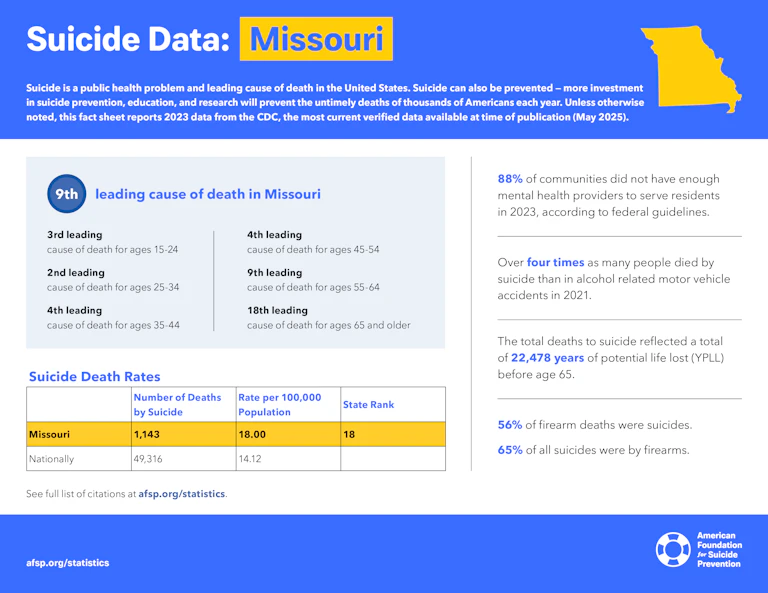Missouri

Missouri suicide prevention plans and initiatives
Missouri’s suicide prevention activities are housed within the state’s Department of Mental Health, Division of Behavioral Health (DMH/DBH), which has led several suicide prevention initiatives with funding from federal Zero Suicide grants first provided in 2014. In 2018, the Missouri Suicide Prevention Network (MSPN), a group consisting of representatives from various organizations and interests across the state, was created to lead statewide suicide prevention efforts and coordinate implementation of the state plan, and in 2020, the MSPN received funding from the Missouri Foundation for Health (MFH) for two full-time positions dedicated to statewide suicide prevention.
Most recently, in partnership with the Missouri Coalition for Community Behavioral Healthcare and DMH, the MSPN released the 2021-2024 Missouri Suicide Prevention Plan which guides Missouri in utilizing three main strategies: fully embrace a public health approach, establish Missouri as a Zero Suicide in Healthcare state, and establish a robust data collection and reporting system.
Missouri laws
Key:
- Required by law
- Encouraged by law
- No law in place
Crisis lines and 988 implementation
- Addresses 988 infrastructure and provides for telecom user fee
- Addresses 988 infrastructure but does not include telecom user fee
- 988 law limited to creating an exploratory commission, advisory committee, or task force
Mental health parity
- Public health plans (e.g., Medicaid) regularly submit parity compliance analyses to state regulators
- Private health plans (individual and group) regularly submit parity compliance analyses to state regulators
K – 12 school suicide prevention
- Inclusion of the 988 Suicide & Crisis Lifeline and/or other crisis line(s) on student ID cards
- Student allowances for excused mental health absences
- School personnel must report student suicide risk to a parent and/or guardian
- Suicide prevention and/or mental health training for certain school personnel, annual
- Suicide prevention and/or mental health training for certain school personnel, not annual
- Suicide prevention, intervention, and postvention policies/programming
- Student education on suicide prevention
- Student education on mental health
Health professional training in suicide assessment, treatment and management
- Mental health professionals receive regular training
- Mental health professionals receive one time training
- Medical/surgical professionals receive regular training
- Medical/surgical professionals receive one time training
Conversion therapy bans
- Prohibits licensed/board certified mental health providers from engaging in conversion therapy with minors under 18 years of age
- Prohibits licensed/board certified mental health providers from engaging in conversion therapy with vulnerable adults
- Prohibits use of state funds for any purpose related to conversion therapy (e.g., conducting, making a referral for, or extending health benefits coverage for)
University and college campus suicide prevention
- Inclusion of the 988 Suicide & Crisis Lifeline and/or other crisis line(s) on student ID cards
- Students receive information on available mental health and/or suicide prevention services and/or resources
- Adoption of suicide prevention/awareness policy or program
Firearms
- Process for extreme risk protection orders (ERPOs)
- State voluntary do not sell list